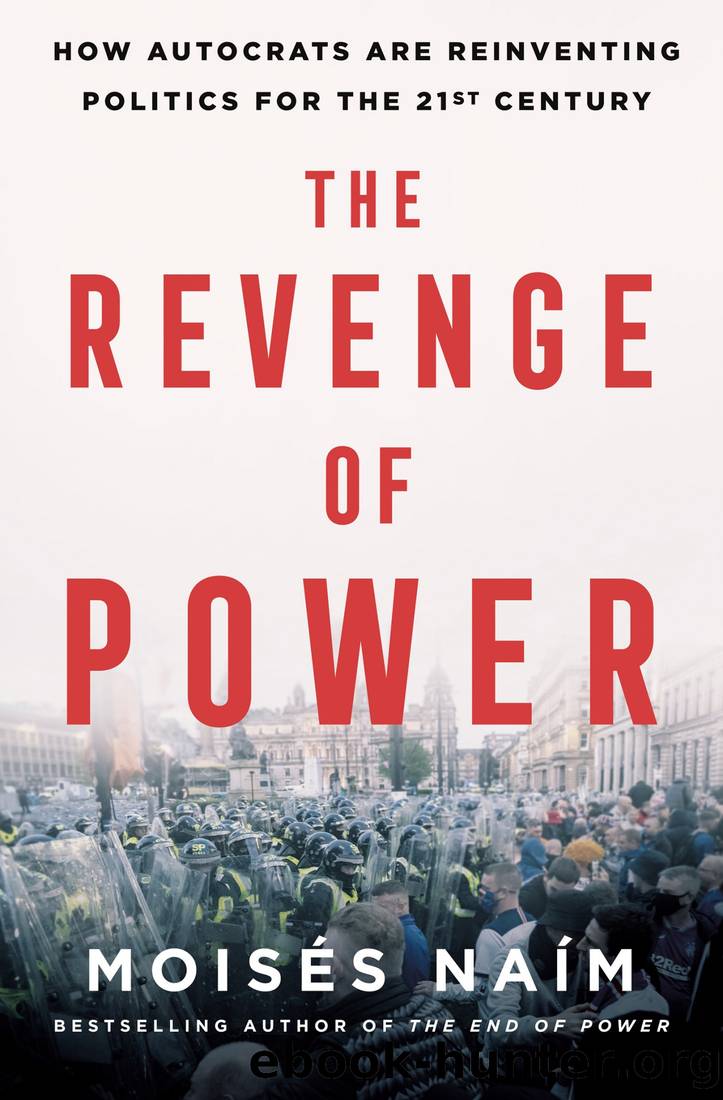The Revenge of Power: How Autocrats Are Reinventing Politics for the 21st Century by Moisés Naím

Author:Moisés Naím [Naím, Moisés]
Language: eng
Format: epub
Tags: Political Science, Political Ideologies, Democracy, Comparative Politics, History & Theory
ISBN: 9781250279217
Google: OwwqEAAAQBAJ
Publisher: St.Martin's
Published: 2022-02-22T20:48:09+00:00
From Anti-Politics to Tropical Extremism
Institutional sclerosis and disempowered national governments seem to be a surefire recipe for sending countries into the anti-politics death spiral, but the most destructive cases come in countries that share three other features: runaway corruption, widespread crime, and a bad economy. Here, the demand for anti-politics sometimes intersects with a yearning for authoritarian leaders, leading to the election of some of the most disquieting 3P leaders of the twenty-first century.
Weâve already seen how frustration over the Philippine governmentâs inability to come to terms with low-level crime fueled demands for the radical, blood-soaked anti-politics of Rodrigo Duterte. But an even more disquieting case of tropical fascism came in Brazil, where the chaotic failure of the entire political system gave rise to a groundswell of support for an extremist with positions that are radical even in politically reckless Latin America.
Brazilian politics has been marked by a peculiar combination of endemic corruption and comparatively strong judicial institutions. Fernando Collor de Mello, Brazilâs second democratically elected president after the fall of its 1960s-era dictatorship, was ousted amid a corruption scandal two years into his term. In 2016, President Dilma Rousseff was removed from office following her impeachment. In the early years of this century, the Brazilian congress housed troves of deputies facing indictment for corruption and other crimes. (To be clear, the culture of kickbacks may not actually be more prevalent in Brazil than in the rest of Latin America, but because its investigative judges are powerful and independent, that corruption ends up seeing the light of day more often.) The result has been a political scene continually roiled by high-profile investigations. First there was the mensalão scandal, where political operators of President Lula da Silvaâs party were found to be paying regular monthly bribes to âoppositionâ members of Congress to support the governmentâs agenda. But that scandal, and many from the same era, paled in comparison with what was to come: the sprawling, massively complex, multinational festival of corruption that came to light in 2014, when Brazilian federal investigators asked themselves how on earth one particular car wash in Brasilia could be doing the volume of business it was allegedly doing. The Lava Jato car wash was soon revealed to be a money-laundering front for Odebrecht, a giant Brazilian engineering firm, which used it to funnel multimillion-dollar payments to politicians and ministers in more than a dozen countries in Latin America and Africa: kickbacks for approving Odebrechtâs bids to take on large infrastructure projects including dams, airports, bridges, rail lines, and more.
The byzantine ins and outs of the Lava Jato scandal have echoes of Italyâs Mani Pulite investigations of the early 1990s, in that they engulfed the entire political class. As investigators pulled on this one loose threadâa car wash that was obviously being used to launder money, Breaking Bad styleâthey came to uncover a tangle of kickback schemes involving the nationâs biggest construction firm that ensnared dozens of members of Brazilâs power elite, including all six of its living former presidents.
Download
This site does not store any files on its server. We only index and link to content provided by other sites. Please contact the content providers to delete copyright contents if any and email us, we'll remove relevant links or contents immediately.
| Comparative | Conflict of Laws |
| Customary | Gender & the Law |
| Judicial System | Jurisprudence |
| Natural Law | Non-US Legal Systems |
| Science & Technology |
American Kingpin by Nick Bilton(3869)
Future Crimes by Marc Goodman(3588)
The Meaning of the Library by unknow(2563)
Inside the Middle East by Avi Melamed(2347)
Why Nations Fail: The Origins of Power, Prosperity, and Poverty by Daron Acemoglu & James Robinson(2280)
On Tyranny by Timothy Snyder(2227)
Living Silence in Burma by Christina Fink(2058)
Putin's Labyrinth(2014)
The Mastermind by Evan Ratliff(1931)
The Smartest Kids in the World by Amanda Ripley(1840)
Think Like a Rocket Scientist by Ozan Varol(1810)
Law: A Very Short Introduction by Raymond Wacks(1735)
It's Our Turn to Eat by Michela Wrong(1718)
The Rule of Law by Bingham Tom(1679)
Philosophy of law a very short introduction by Raymond Wacks(1653)
Leadership by Doris Kearns Goodwin(1632)
A Dirty War by Anna Politkovskaya(1611)
Information and Communications Security by Jianying Zhou & Xiapu Luo & Qingni Shen & Zhen Xu(1611)
Civil Procedure (Aspen Casebooks) by Stephen C. Yeazell(1540)
